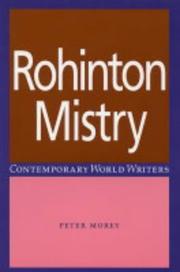| Listing 1 - 2 of 2 |
Sort by
|

ISBN: 0719067154 0719067146 9780719067143 9780719067150 9786610734603 1781700583 1280734604 1847791034 9781526120656 9781847791030 9781280734601 9781781700587 1847795919 1526120658 Year: 2004 Publisher: Manchester ; New York : New York : Manchester University Press ; Distributed exclusively in the USA by Palgrave,
Abstract | Keywords | Export | Availability | Bookmark
 Loading...
Loading...Choose an application
- Reference Manager
- EndNote
- RefWorks (Direct export to RefWorks)
This study - the first of its kind - situates Rohinton Mistry's writing in its cultural and historical context. It explores key features, such as the legacy of Zoroastrianism, Parsi anglophilia, recent Indian history, the conventions of oral storytellling common to Persia and South Asia, and the experience of migration which now sees him living in Canada. The texts are viewed through the lens of diaspora and minority discourse theories to show how Mistry's writing is illustrative of marginal positions in relation to sanctioned national identities.
English Literature --- English --- Languages & Literatures --- 820 "19" MISTRY, ROHINTON --- Engelse literatuur--20e eeuw. Periode 1900-1999--MISTRY, ROHINTON --- Mistry, Rohinton, --- Criticism and interpretation. --- Rohinton Mistry, --- מיסטרי, רוהינטון, --- Literary studies: fiction, novelists & prose writers --- literature --- mistry --- postcolonial --- parsi --- India --- Jahangir --- Mumbai --- Parsis --- Zoroastrianism --- Literature --- Literary Studies: Fiction, Novelists & Prose Writers --- LITERARY CRITICISM / Asian / General --- Asia --- LITERARY CRITICISM / Asian / General. --- Family Matters. --- Fine Balance. --- India. --- Indian political history. --- Man Booker Prize. --- Parsee. --- Rohinton Mistry. --- diaspora. --- migration. --- postcolonial literature.
Book
ISBN: 9780691215754 0691221065 0691195226 0691215758 Year: 2021 Publisher: Princeton, NJ
Abstract | Keywords | Export | Availability | Bookmark
 Loading...
Loading...Choose an application
- Reference Manager
- EndNote
- RefWorks (Direct export to RefWorks)
A groundbreaking history of the political ideas that made modern IndiaViolent Fraternity in the Indian Age is a major history of the political thought that laid the foundations of modern India. Taking readers from the dawn of the twentieth century to the independence of India and formation of Pakistan in 1947, the book is a testament to the power of ideas to drive historical transformation.Shruti Kapila sheds new light on leading figures such as M. K. Gandhi, Muhammad Iqbal, B. R. Ambedkar, and Vinayak Savarkar, the founder of Hindutva, showing how they were innovative political thinkers as well as influential political actors. She also examines lesser-known figures who contributed to the making of a new canon of political thought, such as B. G. Tilak, considered by Lenin to be the "fountainhead of revolution in Asia," and Sardar Patel, India's first deputy prime minister. Kapila argues that it was in India that modern political languages were remade through a revolution that defied fidelity to any exclusive ideology. The book shows how the foundational questions of politics were addressed in the shadow of imperialism to create both a sovereign India and the world's first avowedly Muslim nation, Pakistan. Fraternity was lost only to be found again in violence as the Indian age signaled the emergence of intimate enmity.A compelling work of scholarship, Violent Fraternity in the Indian Age demonstrates why India, with its breathtaking scale and diversity, redefined the nature of political violence for the modern global era.
Political science --- Political violence --- HISTORY / Asia / India & South Asia. --- Violence --- Political crimes and offenses --- Terrorism --- Administration --- Civil government --- Commonwealth, The --- Government --- Political theory --- Political thought --- Politics --- Science, Political --- Social sciences --- State, The --- History --- Alain Badiou. --- Ananya Vajpeyi. --- BJP. --- Bharatiya Janata Party. --- Cambridge political thought. --- Carl Schmitt. --- From the Ruins of Empire. --- Ghadar. --- Hannah Arendt. --- Indian National Congress. --- Indian democracy. --- Indian history. --- Indian political history. --- Indian political thinkers. --- Indian political thought. --- Indian politics. --- Modi. --- Narendra Modi. --- Pankaj Mishra. --- Righteous Republic. --- Slavoj Zizek. --- South Asia. --- global intellectual history. --- partition. --- political Islam. --- political theology. --- political thought. --- republicanism. --- sedition. --- sovereignty.
| Listing 1 - 2 of 2 |
Sort by
|

 Search
Search Feedback
Feedback About UniCat
About UniCat  Help
Help News
News